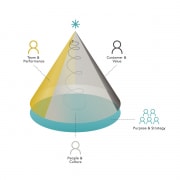Leadership – from Suffering to Meaning
Leadership suffering? A recent coaching case with an experienced executive motivated us to present this case. Suffering is a term that has been coined by this coachee. The more intensively he got into working with himself, the more this topic gained in depth. For him. And probably not only for him.
How contemporary is “suffering”?
Suffering and leadership – is it at all opportune to use such a term today? A double yes is the answer.
On the one hand, it speaks for the fact that Goethe already showed us in “The Sorrows of Young Werther”, that the one who loves, suffers in the end. To associate leadership with love is a beautiful and thoroughly contemporary thought.
On the other hand, after many years under the primacy of “positive thinking” and the consequent reinterpretation of every attitude and statement into a “respectful formulation”, we are slowly allowing ourselves to name limiting thoughts and feelings again. This can be interpreted as a contribution to authenticity and to being human. And then there is a place for suffering. Above all, for those who come from a socialization where tolerating, accepting and bearing were still among the common virtues. And there are of course quite a few of them.
Managers are human
How could it happen that the coachee, trained at the best leadership schools in the world according to the latest leadership theories, came into contact with his own suffering? He probably does not belong to the category of ignorant managers, who are only able to see themselves, immune to change and not interested in their environment at all. It’s rather the opposite, he loves his job, taking people along, inspiring and at the same challenging and encouraging them.
Suffering slowly crept in over the years. At first rather unnoticed, which was also owed to the ideas of “positive thinking”. Then repressed and negated, probably due to personal socialization. At some point, sadness could no longer be repressed because one’s own values and self-efficacy were no longer sufficiently expressed. And the rage about how he was trapped in a role, again and again trying to adapt in all possible directions.
The employee satisfaction survey came along, where several requirement hat to be satisfied. Therefore, it was always better to be friendly, to never criticize or demand too much of anyone. It is best to practice indifference and distance. On the other hand, there was the pressure in terms of the numbers that had to be proven. If necessary, why not invest yet another night shift. Not to forget the employees, who felt that they received too little attention, but were increasingly quick to express their frustration loudly and quite often without the self-imposed appreciation. Personal needs were overlooked and had to be held back – social contacts, culture or simply fun in life became increasingly rare. Just ticking things of, ticking, ticking, ticking. And at some point, it didn’t work any longer, even with the negation, and he became aware of his “suffering”.
Is suffering really necessary?
It was obvious to take up this question in a suitable coaching context. And that like a sting into a wasp’s nest. No, of course not, the mind will say. Yes, the heart will respond, of course. It’s all about something. About one’s own values. Reliability, responsibility, love for the tasks and the people around him. Caring about the success of the company, the team and the individual. Self-efficacy and pride.
The basic assumption: Perseverance, tolerance and acceptance are the toll. The belief: If I only exert myself enough, I can manage it in the end. With the two of them pretty much inevitably leading to “suffering”. The head understood that, too.
From suffering to meaning
The recognition of what had worked so far over all the years while deforming the personality without even being perceived was a like a (healing) shock. And the trigger for one’s own transformation. At the beginning, there was the confrontation with the “suffering of leadership”, its roots and reasons in the here and now. At this point, the coachee found the methods of mindfulness and focused attention particularly helpful. Through this way he was able to find a better access towards himself again. Some everyday situations were reassessed and will certainly be dealt with differently in the future.
However, the found working on his own purpose to be particularly effective. He focused on his individual WHY (Simon Sinek) within his role. He named the meaning of his actions for the first time and subsequently redefined leadership for himself. For himself and in his team, he now relies heavily on self-management. He consistently hands over responsibility to his team. One example that has helped him a lot was working with the “Delegations Poker” of Management 3.0. The exciting effect is that he now has noticeably more time for himself, and without any additional effort of his own a significantly higher satisfaction among the people in his team.
In any case, the suffering has found an end and is now replaced by what one calls the “Purpose of Leadership”.






